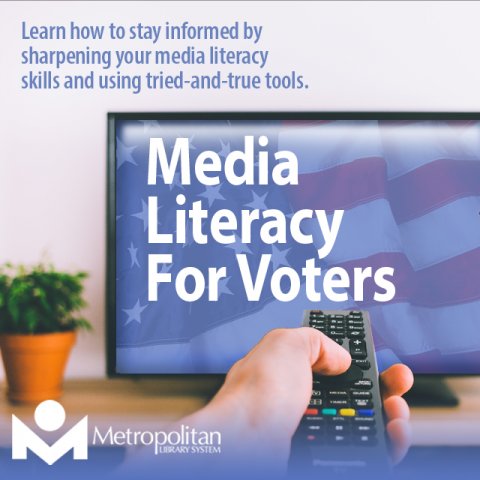
Media Literacy for Voters
Every election season we all get bombarded with mailers, online posts, and TV ads for candidates or issues, both at the national and local level. Campaigns are consistently adapting their outreach; efforts might range from texting community members to hosting live townhalls. How can we evaluate what we’re seeing and hearing? How do we know who these people are, and whether they’d do a good job in their elected positions? How do we wade through all this election-related content?
Sharpening our media literacy skills and using tried-and-true tools are the best ways to stay informed.
Mailers
Questions to Ask
- Who made this? A candidate? The official office of the candidate’s campaign? A group or association?
- Beneath the biggest picture or lettering, what does the small print say? How much detail is there?
- What is the tone or emotional message? Is it meant to give a feeling of positivity toward a candidate, or for an issue? Or is it a totally negative tone against a candidate, or against an issue?
- Does this mailer refer to any other media or group of people as endorsements? Is there a way you could easily learn more about the issue from the referred article or group of people?
Social Media Posts, Websites, and Internet Links
Questions to Ask
- How did this get on your screen? Did you ask for this email or visit this website yourself, or did someone send it to you, or post it in a way you can’t avoid?
- Where is this message coming from? (Online? That’s a harder question to answer than in print or broadcast media.) How many messages of this kind have you seen or received from the tool you’re using now?
- Is this something a friend or relative sent you or posted? If so, how would you talk to that person face-to-face about this message? Are they a trustworthy source?
- Again, is there emotionally charged imagery? Is the tone of the message meant to make you feel strongly?
- How easy is it to follow up with the details of the message? Are there other easily linked articles to read on the same person or issue?
Ads
Questions to Ask
- Have you heard something new from this ad? Are you being introduced to a new person or “breaking news” about an issue? Most ads are not news—they are counting on an audience to be familiar with some aspect of a campaign.
- Who has made this ad? It is traditional for candidates appearing in ads themselves to say, “I approve this message.” But remember that anyone may create an ad that appears on TV or online, so we should remember that all kinds of people are influencing voter opinion through advertising.
- Once again, ask what kinds of emotions are being brought up in this ad? Is your emotional reaction going to be a factor in your decision about voting?
Answering these kinds of questions and getting more information is easy when the candidate is someone running for national office or the vote is a well-publicized question on the ballot. But all of us need to take the time to follow up on names we’ve never heard before or issues new to us. Below are some of the best tools we can use.
Where to Find Out More?
Newspaper Articles
In the Oklahoma City area, our local paper of record is The Oklahoman. There are also papers from Edmond, Norman, Tulsa, and other communities which will cover campaigns and voter information. Articles are archived electronically and accessible through Library databases. Once you log in to one of the newspaper databases, search the name of the candidate or the topic phrase of the state question or local issue. Need help accessing any of these? Give us a call at 405-231-8650.
Interviews
Local TV and radio often host candidates or panel discussions on news broadcasts. If you’ve missed one, usually an Internet search using the candidate’s name or the topic phrase will bring up results of recorded interviews you can watch online.
Endorsements
Groups you trust or famous people you trust may make a speech or record something in support of a candidate or issue.
Voting Records
Remember, finding information about incumbent candidates is much easier than finding information about people who have never run for office before. Looking at a person’s voting record is an accurate means of learning about an experienced politician. Use Ballotpedia to look up voting records, biographies, and issues.
Other Helpful Resources
There are websites dedicated to checking accuracy in all kinds of media. Two of the most well-known are PolitiFact and FactCheck.
Check out the following How To Spot Fake News Infographic.
This article from American Libraries talks about media literacy in an age of fake news.
Last but not least, public libraries around the country have been working to keep us well informed for a long time. Make sure to check out Metro’s Voter Resources page to help you navigate voter information.